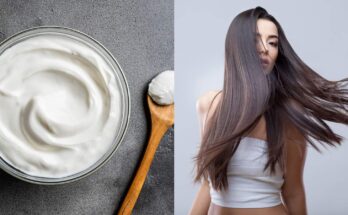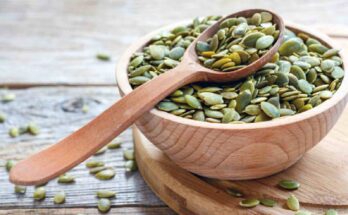If you want long, luscious locks, try using castor oil for hair growth! Know its benefits and how it can give you healthy hair.
When it comes to keeping hair moisturised, choosing the best oil can make a world of difference. Castor oil is one such popular option. A thick, pale yellow vegetable oil produced from the seeds of a castor plant, it comes with a host of benefits. What makes it great for hair is its richness in ricinoleic acid, known to have anti-inflammatory and hydrating properties. It may help to moisturise and strengthen hair, which is why it is found in many hair and skincare products. Besides this, using castor oil for hair growth is also one of the reasons that make this a number one option for your locks.
Castor oil for hair growth
The richness of ricinoleic acid in this oil can be beneficial for hair, especially if you are combatting hair loss. Ricinoleic acid may reverse hair loss, according to a 2015 study published in the Journal of Ethnopharmacology. “It can promote hair growth by enhancing blood circulation to the hair follicles, and increasing oxygen and nutrient supply to them,” explains dermatologist Dr Neha Khuraana.

This oil also consists of fatty acids like omega-6 and omega-9 fatty acids. For a 2015 study published in the Journal of Cosmetic Dermatology, 120 participants with female-pattern hair loss were selected. Half of them took a supplement containing omega-3 and omega-6 fatty acids for six months, and the other half did not consume it. Researchers found that the participants who took the supplement had thicker hair than the ones who did not. The participants who took the supplement also noticed less hair loss.
Are there more benefits of castor oil for hair?
This type of oil may help with hair growth and prevent hair loss, and offer several other benefits for hair:
1. Hair moisturisation
People who have dry hair can nourish their hair by applying this oil. Ricinoleic acid and its derivatives in it have a moisturising effect, as per research published in the International Journal Of Trichology in 2022. It acts as a natural emollient and can easily trap the moisture in hair strands.
2. Strengthens hair strands
It can also promote strong tresses, owing to its high content of omega-6 and omega-9 fatty acids. “These fatty acids strengthen the hair shaft, and in turn, prevent breakage,” says the expert. Hair breakage is something that should be avoided, as it can leave you with frizzy hair. If that continues, you may end up with thinning hair.
3. Anti-inflammatory effect
Dandruff or itchiness are some of the common problems related to the scalp. This oil has beneficial effects, including anti-inflammatory, antioxidant, and antifungal properties, as per research published in the Nutrients journal in May 2024. So, it can help in getting rid of dandruff or itchy scalp, especially due to ricinoleic acid.
4. Adds luster to hair
Since this nutritious oil is a natural emollient, it can be great for those with frizzy and dry hair. It can not only do away with dry hair, but also give it a smoother appearance. “It can also add shine to your hair,” says the expert.
How to use castor oil for hair?
1. For dry hair
Those with frizzy and dry hair can use a combination of this oil and coconut oil in the ratio of 50:50. “It has hydrating properties and so does coconut oil, owing to the presence of lauric acid,” says the expert. Use this hair oil combination on your hair strands then wash it off with a shampoo after a few hours.
2. For oily hair
This oil may help to grow hair, but it is greasy too. So for those with oily scalp, this oil needs to be mixed with some lighter oil to balance out the natural oil of the scalp. So mix one part of the oil with two parts of jojoba oil and apply it on the scalp. Wash it off after 30 minutes of application.

3. For curly hair
Curly hair can be hard to maintain since it can easily get tangled. “Combine it with argan oil, an oil rich in antioxidants and vitamin E,” says the expert. Mix them in the ratio of 50:50 and apply on hair to maintain the curls.
4. For thin hair
People with thin hair need an oil that won’t weigh down the tresses. Almond oil is light and less sticky. So if you have thin hair, you can take one part of castor oil and mix it with three parts of almond oil.
What are the side effects?
- In rare cases, people may experience acute hair felting, a condition in which the hair becomes twisted, and entangled, as per research published in the International Journal Of Trichology in 2017.
- Sometimes, improper use of this oil may lead to more hair fall. If it is applied without diluting it, it may lead to hair getting more tangled.
- Its thick consistency can cause oil buildup on the scalp and make the hair look greasier and can also clog the hair pores, especially in people with an oily scalp.
- It may cause scalp irritation too, especially with over usage, so apply it only once a week.
Frequently asked questions (FAQs)
1. Can you directly use castor oil on hair?
It is better to dilute it before applying it to your scalp. Due to its thick consistency, many individuals prefer diluting it with another oil such as coconut oil. Use this oil in moderation, as its thick nature can cause oil buildup on hair and make it look greasy.
2. Can castor oil be used for scalp psoriasis?
Yes, the ricinoleic acid in this oil is a great anti-inflammatory agent. It can help with the scalp symptoms of redness, itchiness or irritation. This in turn can be helpful in dealing with scalp psoriasis. But check with your dermatologist before using it as a treatment for scalp psoriasis.
3. Can you leave castor oil on the scalp overnight?
It can be left on the scalp overnight, as oil gets more time to penetrate the hair scalp and follicles. But the oil has to be thoroughly washed with shampoo the next day so that it does not give a greasy appearance. But it is better to leave the oil in your hair for one to two hours because of its thick consistency. People who already have oily hair, should not keep it overnight, as the hair pores might get clogged.
Source link






